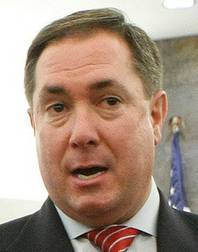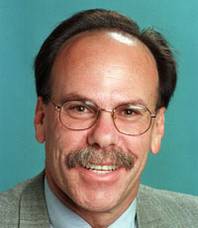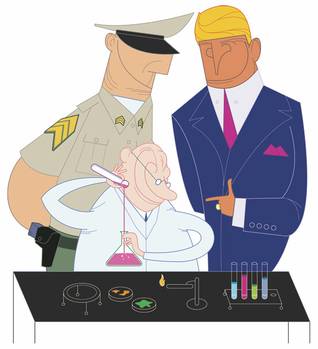Tuesday, July 19, 2011 | 2 a.m.

David Roger

Phil Kohn
Sun archives
For all the questions about whether Metro Police are competent enough to operate their crime lab, the biggest question of all may be whether Clark County has the money to establish an independent lab.
The issue was raised after the department revealed that its crime lab mishandled DNA evidence that caused a wrongful conviction in a robbery case.
Clark County District Attorney David Roger says it’s logistically important for Metro to run the crime lab because prosecutors work closely with police. And for that reason, Public Defender Phil Kohn thinks an independent lab would be important to remove any sense of prosecution bias.
Nationally, many leading scientists say forensic labs shouldn’t be administered by police or prosecutors but instead by impartial parties, which the National Academy of Sciences recommended to Congress two years ago.
The academy argued that forensic scientists “sometimes face pressure to sacrifice appropriate methodology for the sake of expediency.” The academy recommended that Congress help states and communities pay for independent labs.
Without federal help, though, it might be impossible to come up with funding.
“The big thing in Nevada is, where would you find the money?” said Robert Correales, an associate professor at UNLV’s Boyd School of Law.
Metro announced July 7 that it would reanalyze more than 200 cases handled by forensic scientist Terry Cook at its lab on West Badura Avenue. That was when the agency disclosed that a DNA mix-up linked to Cook incorrectly implicated Dwayne Jackson in a 2001 robbery in the southwest valley for which he served four years in prison before his release in 2006. Cook was placed on paid administrative leave as Metro continues its internal investigation.
The only other time the lab was tied to errors that resulted in charges being dropped was in 2002, when it was disclosed that Lazaro Sotolusson spent a year behind bars for sex crimes he didn’t commit because his DNA samples were inadvertently switched with those of a cellmate.
Jackson is one of many people nationwide who have been released from incarceration nationwide because of police lab mistakes. Metro Police declined to immediately respond to questions about the lab.
But Roger prefers the status quo, arguing that mistakes also can happen in independent labs.
“Because of our working relationship with Metro, we can get cases examined and results delivered to us in a timely fashion,” Roger said. “When you’re dealing with an independent lab there’s no accountability to prosecutors and therefore cases could very well languish for a period of time. It’s important for us to have access to experts so prosecutors can understand the science and results and we might not have that access with another lab.”
It would be even worse, Roger said, if his office were forced to use an out-of-state lab.
“With a witness from out of state, you’re taking them away from the lab for an extended period of time,” he said. “We don’t have the funding to bring in out-of-state experts with the frequency we would need.”
Kohn supports an independent lab, saying it would give the prosecution and defense equal access to the testing versus the Metro lab, which he said works much closer with Roger’s office.
“We have a tough time getting things from Metro through subpoenas,” Kohn said. “If there was an independent lab, the lab would honor our subpoenas as well as the district attorney’s subpoenas.”
Kohn’s office often requests help from out-of-state labs to verify Metro’s lab results, typically costing $1,000 per request. This is done, Kohn said, because the outside lab may be able to determine whether the police lab overstated results that hurt the defense.
“In life and death cases, we always give testing a second look to make sure there aren’t errors,” he said. “But I would be more comfortable in everyday cases if I had the same access to the lab that the district attorney has. It would be a lot better for everyone if we had one lab we could all use and it would save us money in the long run.”
Writing for the Utah Law Review last year, law professor Paul Giannelli of Case Western Reserve University in Cleveland discussed two of the biggest scandals:
• West Virginia State Police Crime Lab forensics expert Fred Zain falsified test results in 134 cases from 1979 to 1989 on behalf of the prosecution, leading the West Virginia Supreme Court to complain of the “corruption of our legal system.”
• Joyce Gilchrist was fired in 2001 from her post as an Oklahoma City police chemist after her work was tied to multiple wrongful convictions in which she allegedly overstated test results and withheld evidence. Included was a death row inmate later exonerated on DNA evidence and another man who spent 15 years in prison for a rape he didn’t commit.
Laboratories run by the Washington State Patrol and the North Carolina State Bureau of Investigation were also subjected to media scrutiny for numerous testing errors in recent years.
“Law enforcement influence over laboratory decisions is a serious problem,” Giannelli wrote. “In an ideal world, independent crime laboratories would be the solution. Crime laboratories, however, have historically developed within police agencies, and decades of entrenchment make it difficult to remove laboratories completely from law enforcement control.”
There is widespread agreement that human error can happen in any laboratory, even those run independently.
Even ACLU of Nevada attorney Allen Lichtenstein, whose organization is a frequent critic of law enforcement, said that having an independent lab offers no guarantee of accuracy.
“The more labs are operated independently, with the proper checks and balances, the more credible the results,” he said. “But the devil is in the detail because it also depends on who operates it and who checks it.”
The Rocky Mountain Innocence Center, a Salt Lake City organization that works to prevent and reverse convictions of innocent people in Nevada, Utah and Wyoming, praised Metro for disclosing its error in the Jackson case. But the center’s director, Katie Monroe, said the center supports the science academy’s recommendation to have forensic evidence processed by independent labs.
“One of our biggest concerns is that forensic technicians often view themselves as arms of the prosecution and police,” Monroe said. “Police detectives often develop tunnel vision in a case and labs will often pursue those predetermined theories. There’s a funneling of evidence. The more separation there is between the forensic people and police the better.”
In its report to Congress, the academy bemoaned the lack of money, staff and training that many police labs face. The scientists called for more funding to improve certain aspects of forensic science, noting for example that more research has been done on fingerprints than bite marks. They also found there are no mandatory requirements for police labs to be accredited or for their workers to be professionally certified, and that there are vast differences among labs in the way forensic science results are given to courts.
A bill introduced in January by Sen. Patrick Leahy, D-Vt., would address many of these concerns by creating an Office of Forensic Science in the Justice Department. But the legislation, now before the Senate Judiciary Committee, doesn’t include the academy’s recommendation to replace police labs with independent ones.
The Metro lab is one of 385 voluntarily accredited by the American Society of Crime Laboratory Directors/Laboratory Accreditation Board, of which just 25 are privately run. The Metro lab was first accredited in 2003 and then reaccredited in 2008. The board can revoke or suspend accreditation, but no lab falls into that category, and just two — in El Paso, Texas, and Nassau County, New York — are on probation, according to the board’s website.
As part of Metro’s Criminalistic Bureau, the lab is overseen by civilian Executive Director Linda Krueger and answers to the technical services division, which reports to Assistant Sheriff Ray Flynn. Metro says it requires all its forensic scientists to submit to annual proficiency testing.
“My take is that in a perfect world, you would want to have an independent lab,” said Correales, whose expertise includes criminal evidence. “But you could have incompetent people in an independent lab, and having an independent lab doesn’t necessarily mean you will eliminate bias. The most important thing is quality control and having oversight that is intellectually honest.”


Join the Discussion:
Check this out for a full explanation of our conversion to the LiveFyre commenting system and instructions on how to sign up for an account.
Full comments policy